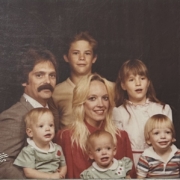Healing Out Loud: Working Through Childhood Trauma While Raising a Special Needs Daughter
Here’s a truth I didn’t think I’d ever type publicly: I’m working through childhood trauma while trying to be a better mom. And yes, it’s as exhausting as it sounds. Being a mom is already a full-time, soul-deep commitment. But being a mom to a child with special needs—specifically, a daughter with Pitt Hopkins Syndrome—adds layers to parenting that most people can’t even begin to understand. And then throw in unresolved childhood trauma? Well, let’s just say the emotional load starts to feel like a 24/7 CrossFit class for your nervous system.
But I’m doing it. Not perfectly. Not even gracefully half the time. But I’m doing it. And in this post, I want to talk about how I’m working through that trauma, trying to be a better mom, and where I’m finding hope—especially in the tiny, beautiful places most people miss.
Unpacking Childhood Trauma While Parenting a Medically Complex Child
I didn’t start this motherhood journey thinking I had all my emotional baggage unpacked. But I also didn’t realize how much of it would show up at my doorstep the moment my daughter was diagnosed with Pitt Hopkins Syndrome. For those unfamiliar, it’s a rare neurological disorder that affects motor skills, communication, and development. It requires constant vigilance, advocacy, and patience.
Childhood trauma doesn’t ask for permission to resurface. It shows up in the most inconvenient ways:
- When I get dysregulated because a therapy session gets canceled last-minute.
- When I snap at someone in a parent group chat because their well-meaning but tone-deaf comment triggers a deep insecurity.
- When I feel paralyzed by decisions that seem small to others but carry a mountain of consequences for my daughter.
These moments have taught me that unresolved trauma doesn’t disappear just because I became a parent. If anything, it demands to be seen. Loudly.
Trying to Be a Better Mom, Not a Perfect One
I used to chase perfection. I wanted to be the Pinterest mom, the hyper-organized mom, the warrior mom who had all the answers. That fantasy didn’t survive long. Pitt Hopkins doesn’t leave room for perfectionism. It demands adaptability, fierce advocacy, and a lot of forgiveness—mostly of myself.
Being a better mom doesn’t mean being perfect. It means:
- Apologizing when I lose my temper.
- Laughing when everything feels like it’s falling apart.
- Saying “I don’t know” in front of doctors, therapists, and even my child, because modeling honesty is more powerful than pretending to have it all together.
- Taking breaks. Like actual, sit-on-the-floor-and-breathe-for-five-minutes breaks.
I’ve stopped trying to meet a standard that was never designed for moms like me. Instead, I’m defining what “better” looks like—on my terms, in my messy, beautiful life.
The Dysregulation Struggle Is Real
Let’s talk about dysregulation. For those who don’t know, it’s what happens when your nervous system goes haywire. You’re not just upset—you’re spiraling. Your brain and body are flooded, and logic? Gone. I get dysregulated more than I’d like to admit, especially when dealing with other people.
I’m working on it. Not because society tells me to “be nice” or “calm down,” but because I want to be emotionally safe for my daughter. When I’m regulated, she feels safer. When I’m grounded, I can advocate better. I can make phone calls without panicking. I can attend IEP meetings without crying in the parking lot afterward (okay, not every time, but it’s progress).
Therapy helps. Deep breaths help. Humor helps a lot. And learning to pause before reacting? That’s become my superpower-in-progress.
Being a Special Needs Mom Is Incredibly Lonely
Let me say it plain: being a special needs mom is lonely. It’s not just that our schedules are packed with appointments and therapies. It’s the isolation of having experiences that most of your peers don’t understand.
- It’s the silence after you share your child’s diagnosis and someone replies, “I’m so sorry,” and nothing else.
- It’s the unspoken grief that lives in your chest when another child meets a milestone your child may never reach.
- It’s the mental load of knowing every system—medical, educational, legal—better than most professionals.
I’ve lost friendships. I’ve outgrown relationships. But I’ve also found depth and connection in places I didn’t expect—like an online support group at 2 a.m., or a quick glance from another special needs mom in a therapy waiting room. These are the people who get it without needing an explanation.
Finding Hope in the Smallest Things
When your life is filled with big challenges, hope hides in small places. I’ve learned to look for it.
- The half-smile my daughter gives me after a sleepless night.
- The one word she said clearly last month (amoma) —after years of silence.
- The kind nurse who didn’t rush us.
- The insurance rep who actually called back.
These moments matter. They are hope in its rawest, most authentic form. And they’re the reason I keep going.
Hope doesn’t always come in grand gestures. Sometimes it looks like surviving the day without a meltdown (from me or her). Sometimes it’s a really good cup of coffee while she naps. Sometimes it’s writing a blog post like this and realizing I’m not alone.
What I’m Learning and What I Want to Share
I’m not here to sugarcoat things. This isn’t the kind of blog where I wrap everything up in a bow and pretend it’s all fine. It’s not always fine. But it’s real. And that counts.
If you’re a parent like me, here’s what I want you to know:
- You’re allowed to have your own healing journey, even while parenting.
- Your dysregulation doesn’t make you a bad mom. It makes you human.
- It’s okay to feel lonely. It’s okay to say it out loud.
- Hope is still here. You just have to learn where to look.
I want to keep writing about this—not just because it helps me process, but because I know someone out there needs to hear it. Needs to know that another mom is in the trenches too, fighting battles that don’t make the news but define her entire world.
The Bottom Line? We’re Doing the Damn Thing
This blog is my way of healing out loud. Of turning pain into power. Of turning isolation into community. I might not have it all figured out, but I have a voice—and I’m going to use it.
So if you’re out there, walking a similar path, trying to be a better parent while navigating trauma, dysregulation, and special needs life, know this: I see you. And I’m with you.
Because even in the darkest seasons, there’s light in the small things. And that light? It’s enough to keep going.




Leave a Reply
Want to join the discussion?Feel free to contribute!